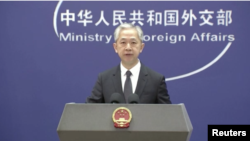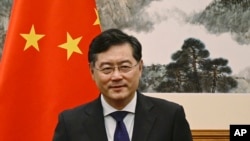The conflict between Israel and Hamas is prompting increased scrutiny of China’s role as a potential mediator in the Middle East. Analysts say the vagueness of Beijing’s condemnation of the terrorist attacks on Israel is consistent with China’s policy of noninterference in global conflicts and reflects the limit of Beijing’s diplomatic efforts in the Middle East.
“China offers these lofty rhetorics and peace plans, but it doesn’t put the weight that countries need to put behind to make these rhetorics and plans happen,” said Raffaello Pantucci, senior fellow at the S. Rajaratnam School of International Studies in Singapore.
“There is not much that China can do and [their remarks] show the limits of [their diplomatic approach],” Pantucci told VOA by phone. “At the same time, I don’t think Beijing wants to do something [to address the crisis]. I think they are quite happy to sit and watch.”
After Hamas launched the initial attacks in Israel, the Chinese foreign ministry expressed serious concern about the escalating violence between Israel and the Palestinians. “We call on relevant parties to remain calm, exercise restraint and immediately end the hostilities to protect civilians and avoid further deterioration of the situation,” the foreign ministry said in a statement on October 8.
In response, an Israeli diplomat in Beijing urged China to issue stronger condemnation of the violence initiated by Hamas, while U.S. Senate Majority Leader Chuck Schumer expressed disappointment at Beijing’s initial statement on the crisis during a meeting with Chinese President Xi Jinping on Monday.
At the regular press briefing on Monday, Chinese foreign ministry spokesperson Mao Ning said China “opposes and condemns acts harming civilians” and said the priority is to “end hostilities and restore peace as soon as possible.” The statement didn’t name Hamas as the perpetrator.
Despite Beijing’s attempt to adjust the tone of its condemnation of the attack, some experts say its actions contradict the image of a “peacemaker” put forward by China throughout 2023.
“Beijing talked about playing a more active role in brokering the peace between Israel and Palestine, but there is a divergence between their rhetoric and actions,” said Ian Chong, an expert on China’s foreign policy at the National University of Singapore.
Chong told VOA by phone that he believes Beijing’s inability to back up its promises with concrete actions may suggest a lack of willingness or capability to influence the situation in the Middle East. He also said if the pattern persists, it may affect China’s image and credibility as a reliable partner.
“The divergence between China’s actions and rhetorics would make more countries pause about Beijing’s ability or its willingness” to be engaged in pressing regional issues, Chong said.
China as a commercial proposition, not a mediator
Prior to the latest crisis between Israel and Hamas, China tried to present itself as a mediator in longstanding conflicts in the Middle East. In March, China brokered a deal between Saudi Arabia and Iran that saw the regional rivals agree to reestablish diplomatic relations and reopen embassies.
It was hailed as a diplomatic breakthrough, and Chinese state media tried to frame the achievement as proof of Beijing’s growing diplomatic influence in the Middle East and around the world.
In April, former Chinese foreign minister Qin Gang told his Israeli and Palestinian counterparts that Beijing is prepared to help facilitate peace talks between the two sides. During both calls, Qin said China would promote peace talks on the basis of fulfilling a “two-state solution,” which was also repeated by Beijing in its statements on the latest conflict.
Despite China’s attempt to project itself as a mediator in the Middle East, Pantucci said, Middle Eastern countries view China as a commercial proposition rather than a country that is willing to resolve contentious regional conflicts.
“China’s response to the Hamas-Israel conflict will reconfirm the impression that China is not really going to play the role of peacemaker,” he told VOA. “Some countries will not mind this while other countries might be a bit angry.”
In the case of Israel, Pantucci said he thinks its leaders do not expect China to resolve the longstanding conflict with Hamas. But, he told VOA, “They would like China to demonstrate more support for them, and they hope China could use its power to weigh and influence some Middle Eastern allies as well."
Pantucci said Middle Eastern countries don’t necessarily dislike China’s “transactional” diplomatic approach, but they may not be long-term partners for Beijing. “If something should happen, it’s not entirely clear which way [Middle Eastern countries] are going to jump,” he said.
And since the scale of the conflict remains uncertain, Pantucci said, he thinks the level of U.S. involvement may result in two different scenarios — creating more space for China, as Washington becomes distracted by another military conflict, or allowing the U.S. to demonstrate itself as a great power in the world while China is just a sideshow.






